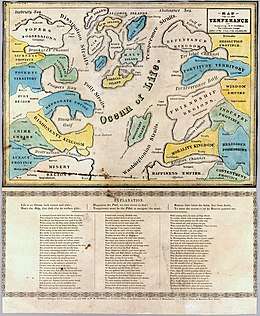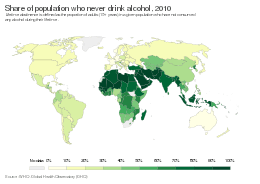Teetotalism
Teetotalism is the practice or promotion of complete personal abstinence from alcoholic beverages. A person who practises (and possibly advocates) teetotalism is called a teetotaler (plural teetotalers) or is simply said to be teetotal. The teetotalism movement was first started in Preston, England, in the early 19th century.[1] The Preston Temperance Society was founded in 1833 by Joseph Livesey, who was to become a leader of the temperance movement and the author of The Pledge: "We agree to abstain from all liquors of an intoxicating quality whether ale, porter, wine or ardent spirits, except as medicine."[2]



Etymology
There is some dispute over the origin of the word teetotaler. One anecdote attributes the origin of the word to a meeting of the Preston Temperance Society in 1833. The story attributes the word to Richard Turner,[2] a member of the society, who in a speech said "I'll be reet down out-and-out t-t-total for ever and ever."[3] Walter William Skeat noted that the Turner anecdote had been recorded by temperance advocate Joseph Livesey, and posited that the term may have been inspired by the teetotum;[4] however, James B. Greenough stated that "nobody ever thought teetotum and teetotaler were etymologically connected."[5]
A variation on the above account is found on the pages of The Charleston Observer:
Teetotalers.—The origin of this convenient word, (as convenient almost, although not so general in its application as loafer,) is, we imagine, known but to few who use it. It originated, as we learn from the Landmark, with a man named Turner, a member of the Preston Temperance Society, who, having an impediment of speech, in addressing a meeting remarked, that partial abstinence from intoxicating liquors would not do; they must insist upon tee-tee-(stammering) tee total abstinence. Hence total abstainers have been called teetotalers.[6]
An explanation is that teetotal is simply a reduplication of the first "T" in total (T-total). It is said that as early as 1827 in some Temperance Societies signing a "T" after one's name signified one's pledge for total abstinence.[7] In England in the 1830s, when the word first entered the lexicon, it was also used in other contexts as an emphasised form of total; a comparable American English locution would be "total with a capital T" (an instance of the "[word] with a capital [word-initial letter]" snowclone).
According to historian Daniel Walker Howe (What Hath God Wrought: The Transformation of America, 1815-1848, 2007) the term was derived from the practice of American preacher and temperance advocate Lyman Beecher. He would take names at his meetings of people who pledged alcoholic temperance and noted those who pledged total abstinence with a T. Such persons became known as Teetotallers.
Reasons and justifications
Some common reasons for choosing teetotalism are psychological, religious, health,[8] medical, familial, philosophical, social, past alcoholism, or sometimes it is simply a matter of taste or preference. When at drinking establishments, teetotalers (or teetotallers) either abstain from drinking completely, or consume non-alcoholic beverages such as water, juice, tea, coffee, non-alcoholic soft drinks, virgin drinks, mocktails, and alcohol-free beer.
Most teetotaler organizations also demand from their members that they do not promote or produce alcoholic intoxicants.
Religion
Abstention from alcohol is a tenet of a number of religious faiths, including Hinduism, such as the Swaminarayans; Sikhism; Bahá'ís; Jains; and Meivazhi-ites.
"Khamr" is the term for all intoxicants which are prohibited in Islam. (See Religion and alcohol § Islam)
Similarly, one of the five precepts of Buddhism is abstaining from intoxicating substances that disturb the peace and self-control of the mind, but it is formulated as a training rule to be assumed voluntarily rather than as a commandment.
A number of Christian denominations also forbid the consumption of alcohol, including the New Order Amish, Seventh-day Adventists, Mennonites (both Old Order and Conservative), Church of the Brethren members, The Wesleyan Church[9], and Christian Scientists. Many Christian groups, such as Methodists, and Quakers, are often associated with teetotalism due to their traditionally strong support for temperance movements and prohibition. However, tenets forbidding the consumption of alcohol are variably practiced. For example, Church of the Nazarene, an offshoot of Methodism does teach abstinence from alcohol.[10] Members of denominations in the conservative holiness movement, such as the Allegheny Wesleyan Methodist Connection and Evangelical Wesleyan Church, practice temperance and teetotalism, thus abstaining from alcohol and other drugs.[11] In many Christian denominations, abstinence is not a religious requirement, but the tradition is strong enough to make ritual and recreational alcohol consumption a controversial issue among members. Uniformed members of the Salvation Army ("soldiers" and "officers") make a promise on joining the movement to observe lifelong abstinence from alcohol. This dates back to the early years of the organisation, and the missionary work among alcoholics. Eastern Orthodox Churches, the Roman Catholic Church, the Lutheran Churches, Oriental Orthodox Churches, and the Anglican Communion all require wine in their central religious rite of the eucharist, and while many Protestant churches often allow grape juice or alcohol-free wine in their communion services, only a few Protestants require a non-alcoholic beverage as official policy. (See Christianity and alcohol.) Members of The Church of Jesus Christ of Latter-Day Saints abstain from alcoholic drinks (and other substances) based on their adherence to the faith's code of health called "The Word of Wisdom".
Many members of these religious groups are also required to refrain from selling such products. A translation of the New Testament, the Purified Translation of the Bible, translates in a way that promotes teetotalism.
Some Christians choose to practice teetotalism throughout the Lent season, thus giving up alcoholic beverages as their Lenten sacrifice.[12][13]
Research on non-drinkers
Dominic Conroy and Richard de Visser published research in Psychology and Health which studied strategies used by college students who would like to resist peer pressure to drink alcohol in social settings. The research hinted that students are less likely to give in to peer pressure if they have strong friendships and make a decision not to drink before social interactions.[14]
A 2015 study by the Office for National Statistics showed that young Britons were more likely to be teetotalers than their parents.[15]
According to Global Status Report on Alcohol and Health, published by WHO in 2011, close to half of the world’s adult population (45 per cent) are life-time abstainers. The Eastern Mediterranean Region, consisting of the Muslim countries in the Middle East and North Africa, is by far the lowest alcohol consuming region in the world, both in terms of total adult per capita consumption and prevalence of non-drinkers, i.e. 87.8 per cent lifetime abstainers.[16]
See also
- Alcoholics Anonymous
- Blue ribbon badge
- Catch-my-Pal
- List of Temperance organizations
- Theobald Mathew (temperance reformer)
- Pioneer Total Abstinence Association
- Sobriety
- Straight edge
- Woman's Christian Temperance Union
References
- Road to Zion - British Isles, BYU-TV; "Archived copy". Archived from the original on 2011-02-11. Retrieved 2011-02-15.CS1 maint: archived copy as title (link)
- Gately, Iain (May 2009). Drink: A Cultural History of Alcohol. New York: Gotham Books. p. 248. ISBN 978-1-592-40464-3.
- Quinion, Michael. "Teetotal". worldwidewords.org. Retrieved 22 April 2012.
- An Etymological Dictionary of the English Language, by Walter William Skeat; published by Clarendon Press, 1893
- Words and Their Ways, by James B. Greenough; published 1902
- The Charleston Observer vol. 10, no. 44 (29 October 1836): 174, columns 4-5.
- "Online Etymology Dictionary - T, page 5". Retrieved 2007-04-30.
- "6 great things that happen to your body when you give up drinking". 20 January 2016.
- The discipline of the Wesleyan Church 2016. Eastlack, Anita,, Wesleyan Publishing House. Indianapolis, Indiana. ISBN 9781632571984. OCLC 1080251593.CS1 maint: others (link)
- "2017-2021 Manual". Church of the Nazarene. Retrieved 27 April 2018.
- The Discipline of the Allegheny Wesleyan Methodist Connection (Original Allegheny Conference). Salem: Allegheny Wesleyan Methodist Connection. 2014. p. 37.
- "Drink less this Lent". Pioneer Total Abstinence Association. 22 February 2009. Retrieved 17 March 2019.
- Gilbert, Kathy L. (21 February 2012). "Could you go alcohol-free for Lent?". United Methodist News Service. Retrieved 17 March 2019.
- Conroy, Dominic; de Visser, Richard (2014). "Being a non-drinking student: An interpretative phenomenological analysis". Psychology and Health. 29 (5): 536–551. doi:10.1080/08870446.2013.866673. ISSN 0887-0446. PMID 24245802.
- Neville, Sarah (February 13, 2015). "Young Britons turning teetotal in growing numbers, survey says". Financial Times. Retrieved September 16, 2016.
- "Global status report on alcohol and health 2018".
External links
